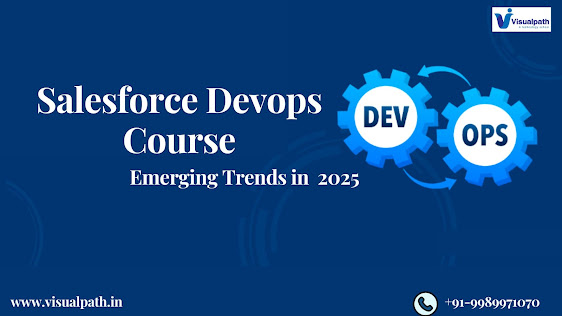Salesforce DevOps : "Decoding Salesforce Essentials: Objects and Fields Unveiled
salesforce devops certification : Decoding Salesforce Essentials Objects and Fields Unveiled
Subheading 1: Understanding
the Foundation - Objects in Salesforce
salesforce devops certification a leading customer relationship management (CRM) platform, revolves around the concept of objects as its fundamental building blocks. In the Salesforce ecosystem, an object is a representation of a database table that stores data specific to an organization's needs. These objects act as containers for various types of information, allowing users to organize and manage their data efficiently.
Subheading 2: Unveiling the Power of Objects
Objects in salesforce devops training can be categorized into two main types: Standard Objects and Custom Objects. Standard Objects, provided by Salesforce out of the box, include commonly used entities such as Accounts, Contacts, and Opportunities. On the other hand, Custom Objects allow users to create personalized data structures tailored to their unique business requirements. This versatility empowers organizations to mold Salesforce according to their specific workflows and processes.
Subheading 3: Navigating
the Landscape - Fields in Salesforce
Fields, the second critical element in the Salesforce data model, define the attributes and properties of an object. Just as columns in a database table store different types of information, fields in Salesforce capture specific details about records within an object. For instance, an Account object might have fields like Name, Industry, and Annual Revenue to capture relevant information about a business entity.
Salesforce supports various field types, each catering to
specific data formats and use cases. Text fields are ideal for storing
alphanumeric characters, while date and time fields are crucial for tracking temporal
information. Picklist fields provide a predefined set of values, ensuring data
consistency, and formula fields enable dynamic calculations based on other
field values. Understanding the diverse field types allows users to fine-tune
data representation in Salesforce.
Subheading 5: Relationships: Connecting the Dots Between
Objects
In the Salesforce universe, the true power of data management lies in establishing relationships between objects. Relationships enable users to connect information across different objects, fostering a comprehensive view of data. Master-detail and lookup relationships facilitate the association between objects, creating a web of interconnected information that mirrors real-world business processes. salesforce devops course
Subheading 6: Configuring Objects and Fields - The Salesforce Admin's Playground
Salesforce provides a user-friendly interface for
administrators to configure objects and fields effortlessly. Customizing page
layouts, defining field-level security, and establishing validation rules are
integral parts of tailoring Salesforce to meet specific business requirements.
The ability to adapt the platform to evolving business needs is a testament to
its flexibility and scalability.
Conclusion:
In conclusion, understanding the core concepts of objects and
fields in Salesforce is pivotal for unleashing the full potential of this
robust CRM platform. As organizations continue to leverage Salesforce for
streamlined data management, mastering these foundational elements becomes a
key driver for success in the dynamic world of customer relationship
management.
Visualpath is the Leading Software Online Training Institute in Ameerpet, Hyderabad. Avail complete SalesForce DevOps Online Training by simply enrolling in our institute Hyderabad. You will get the best course at an affordable cost. Attend Free Demo
Call on - +91-9989971070.
Visit: https://www.visualpath.in/online-salesforce-devops-training.html




Comments
Post a Comment